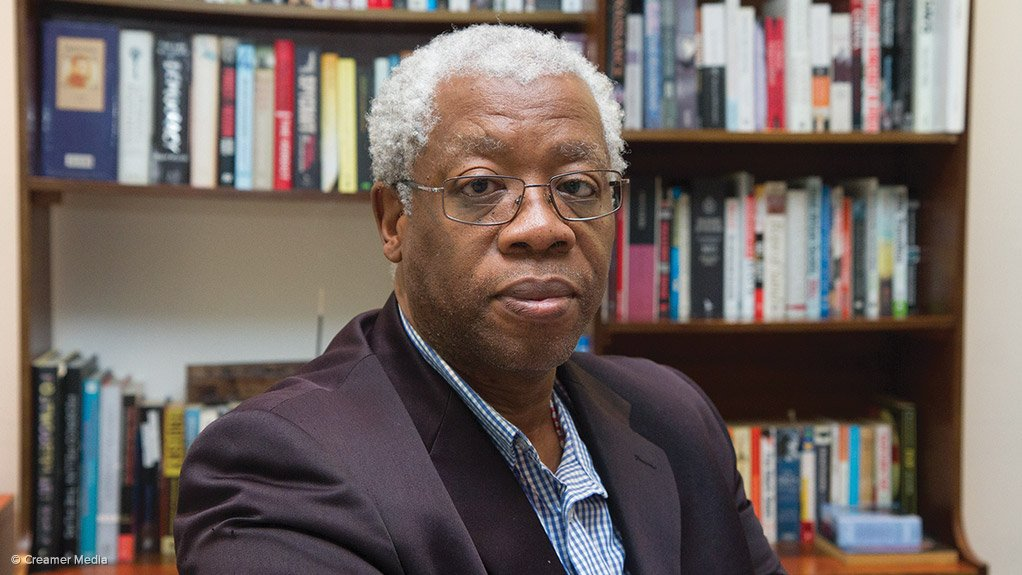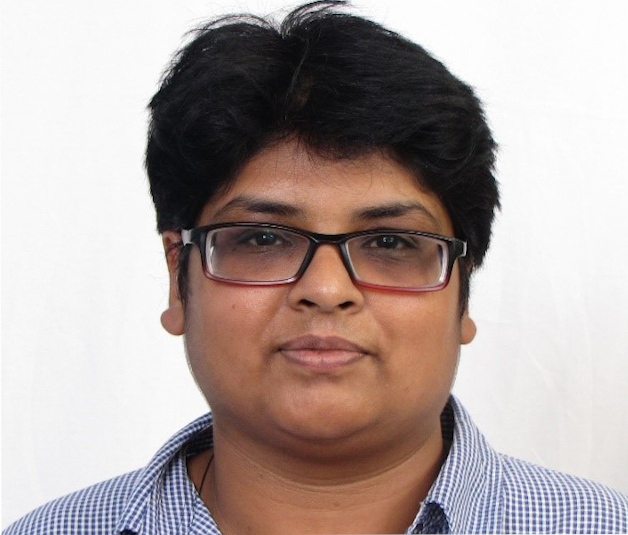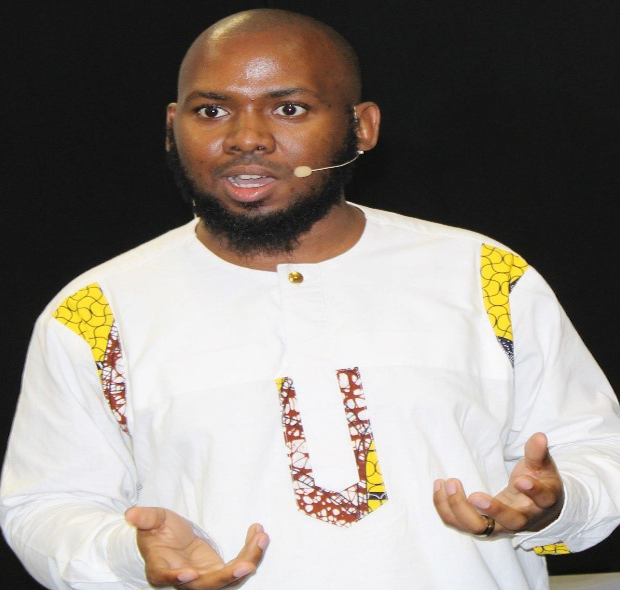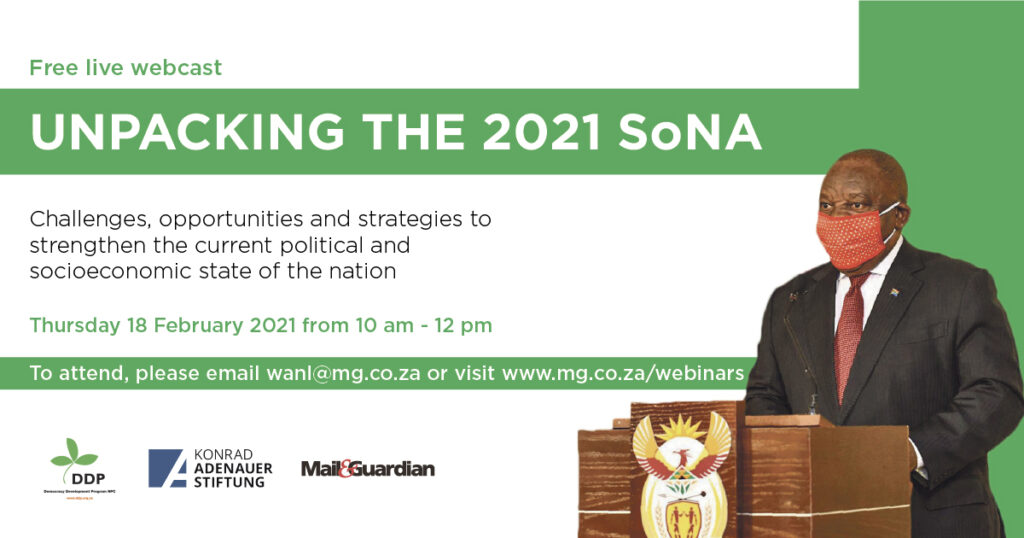Dr Paul Kariuki of the Democracy Development Programme
This Mail & Guardian webinar was sponsored by the Democracy Development Project (DDP). It featured as speakers Aubrey Matshiqi, Independent Political Analyst; Sanusha Naidu, Foreign Policy Analyst and Paul Kariuki, Executive Director, DDP. It was moderated by Sphamandla Brian Mholongo, Senior Programmes Officer at the DPP.
It was the opinion of all the speakers that this year’s state of the nation address (Sona) was the usual bag of hot wind: promises and plans that amount to little or nothing at all. The government and president have lost touch with what is happening on the ground, which is hardship and loss. To regain lost trust the ruling party must consult with citizens to determine their needs, instead of imposing top-down rule. And, to monitor progress made, a civil society Sona may be a way to ensure that in future, what the president promises, he fulfils.
Paul Kariuki kicked off proceedings with Sphamandla Brian Mholongo, who introduced and welcomed the speakers, and outlined how the webinar would proceed.
Aubrey Matshiqi said the people of South Africa have real concerns, such as hunger, malnutrition and unemployment. Women have borne the brunt of these, and the effects of the virus, more than anyone else. The State of the Nation Address (Sona) did not address their concerns; and most of the jobs regained have gone to men.
 Aubrey Matshiqi, Independent Political Analyst
Aubrey Matshiqi, Independent Political AnalystHe said the Sona did not bridge the gap between words and the reality happening on the ground in South Africa. Colonialism was a phenomenon that colonised not only space and bodies, but the spirit too, about what it means to be human, and Sona did not address this either: how our spirit has been colonised.
This does not mean that the president did not say anything important. There is little to indicate that much has or will be achieved regarding key targets of the National Development Plan, “but our politicians are lucky, as they will be able to lay the blame at the door of Covid-19”, said Matshiqi. “Regarding the vaccine, we are supposed to believe that 35-million people will be vaccinated by the end of the year. My suspicion is that some people will be vaccinated, but not 67% by the end of 2021. This means we will have to get used to living side-by-side with Covid-19 for the next few years.”
The private sector is supposed to get the economy moving again, but I think big business will adopt a holding position, and it was not impressed by what the president said, or don’t believe him, as they have heard it all before in previous years, and the structural reforms they are demanding have not been fulfilled. The R350 grant will be extended, but Black Sash has said that this is insufficient; an amount of R585 is what they recommend, and even that is not enough.
Conditions for creating economic growth must be established, and women, who are the primary caregivers, need quality jobs. Eskom will be broken down into three private-public owned entities, and a “super-ministry” will be created to run state-owned enterprises, but what kind of internal battles will this result in within the ANC? Ramaphosa said advances had been made in checking corruption, but corruption has become the dominant culture in South Africa; there is an attempt to pretend that it is the main challenge in our country, but “I contend that inequality is really the main challenge”, said Mashiqi. Constituencies that benefit from inequality find it more comfortable to talk about corruption. This problem will not disappear by re-engineering government institutions, in the same style as Jacob Zuma’s government did.
 Sanusha Naidu is a Foreign Policy Analyst
Sanusha Naidu is a Foreign Policy AnalystSanusha Naidu said that there were high expectations for this year’s Sona. The nation is in a state of crisis, and Ramaphosa is fighting internal battles in the ANC. What would his plan be, everyone wondered? Unfortunately, there was no discernible plan, and there never has been one in previous years: it is more of a ceremonial presentation. What he basically told South Africans is that they have to carry on making sacrifices, and this from a government that is not delivering, and with ever-deepening inequalities. So there was a lot of disconnection, and the speech didn’t create the confidence or inspiration in South Africans that Ramaphosa may have hoped for. He talked about macro issues instead of what people are actually experiencing: how they are going to deal with their financial challenges, and extremely poor service delivery.
The second disconnect was that Ramaphosa spoke about things that we already know about, and he didn’t amplify or expound on how issues would be solved. For instance, having the spectrum auction may make the internet faster, but what about the issue of expensive data, and how data is not accessible to most South Africans because of collusion among service providers that has priced most people out of the market? This issue must be addressed.
Ramaphosa never spoke about the reality of people having less in their pockets, and people are losing trust in government because of this. Or economy has shrunk by 7.5%, and it was already in crisis before the pandemic; how are we going to fix this? The president seemed to indicate that other people must resolve the problem. We know what our problems are and what needs to be done, and we certainly don’t need more institutions and bureaucracy to deal with, for instance, corruption. In trying to balance his speech, there were very few solutions actually offered; the implementation is very thin on the ground.
There was very little about foreign policy, beyond a mention of the African Continental Free Trade Agreement. He did not address the patent issue regarding the Covid-19 vaccine, which would cut costs and increase accessibility. Everything has been left to the forthcoming budget speech, said Naidu.
Mholongo concurred, saying that Ramaphosa did not provide enough direction or leadership; but at least there was very little ceremony involved in Sona this year. Naidu said Sona was supposed to be something different this year: the people didn’t want the usual “we will, we should” — they wanted more concrete information and decisiveness. This led to many listeners switching the speech off. Ethical leadership comes from the people you appoint; we need to address the real issues such as poverty and poor education urgently.
Matshiqi said it seems the president never left the Codesa negotiating room, and has never adopted social compacting as an effective means of change. The DA said Sona was littered with promises of reform, but announcements made in previous Sona speeches have never led to real change, in legislation or elsewhere. The budget speech may be the tail that wags the Sona speech and the state itself. Both speeches are plutocratic in approach.
 Sphamandla Brian Mhlongo is the Senior Programmes Officer at the Democracy Development Program
Sphamandla Brian Mhlongo is the Senior Programmes Officer at the Democracy Development ProgramWhile many families benefit from social grants, this signals the gaps in this and previous Sona speeches; perhaps he should extend his family meetings to make concrete changes to the problems families are facing. Mholongo agreed, and pointed out that President Joe Biden engages with small groups constantly, and why can’t this happen here. Naidu said there should have been more interaction in Ramaphosa’s family meetings, but they are a great idea, especially if there were constant updates. The relation between party and state is very destructive, and voters tend to identify with Ramaphosa instead of the party itself. The president is trying to be a consensual leader, but this may not be the best tactic.
A poll conducted in the webinar revealed that most people felt Sona did not address their issues on a personal level at all. Paul Kariuki said the poll results show that people are disaffected, and most people feel the government is not delivering. The ANC is hiding its head in the sand and there is little trust in how things are being run. How is local governance going to change? Most citizens find it going to any public office very traumatic. Talk must be translated into action; citizens must be prepared to confront their own party, on issues such as cadre deployment. The government thinks it knows what citizens want: it must find out what good service is from their perspective. People don’t feel that they are being heard: everything is top-down.
How do we minimise levels of inequality in South Africa, asked a member of the webinar audience? The challenge is spatial organisation, but it is also inter-generational. The market and its prices determine everything, which makes the “social compact” null and void. Those at the bottom are constantly having to play catch-up. Across the world, we are relying on growth to lead change and close the inequality gap. We are banking on big investment coming in, but we should really be focusing on is supporting small businesses and SMMEs — they are the ones who should be getting the tax breaks.
Why are citizens not voting for the opposition parties, was a question asked? Mashiqi said the ANC must be reminded about what its original goal was: to create a society opposite to that of apartheid. Has Sona taken us closer? No, and elections haven’t either. In the last election, 18-million eligible South Africans did not vote; these citizens have no confidence in elections being able to effect change, or the opposition, as the political system itself is sick. The liberal democratic system is not working.
Naidu said people feel excluded from the political process. When they stay away, this is a protest vote, but this doesn’t help to change the status quo. People eventually become frustrated, and may end up “storming the bastille”. It will be interesting to see what effect the political party funding Act has, as it costs a lot of money to run as a party. The local government elections will be interesting, as coalitions may occur, but voter numbers may drop because of the pandemic.
Kariuki said that citizens must start working out and addressing what the gaps are in the president’s Sona; there must be more civil action, and pressure put on politicians at an advocacy level. The state is not meeting people’s expectations; the model is wrong. There needs to be an open market as people cannot rely on the state for impetus. Naidu agreed and said activism is essential and must be supported; some activist groups have diversified and are monitoring things like the rollout of the vaccine. A civil society State of the Nation Address could be useful to outline what the real issues are, which would be a useful tool to monitor if government is keeping things on track.
Mashiqi said that when you look at the models that the state is trying to introduced, it must be remembered that it cannot outperform the quality of the people it has put in charge. Without the correct people in charge, changing models won’t make any difference. Regarding civil participation, people, communities and especially women must see themselves as policy initiators; if they do so, perhaps the next Sona will have different content. It should not be left up to the politicians to dictate the content. Unless citizens act as policy initiators and identify gaps between what is promised and actually delivered by the government, we will always rely on parliament’s failed capacity to perform its oversight function. We must be vigilant and ensure the ruling party does not use the Covid-19 crisis to close down or narrow the democratic space.
To view the webinar, click on the image below:
